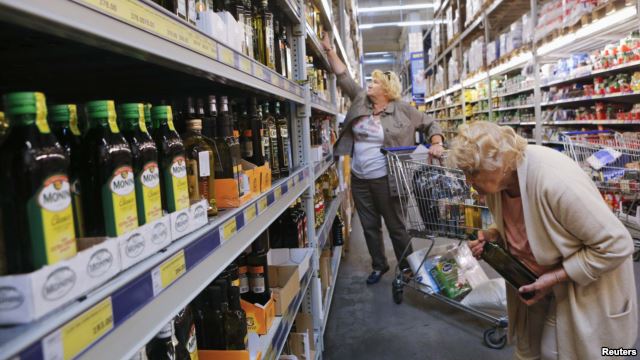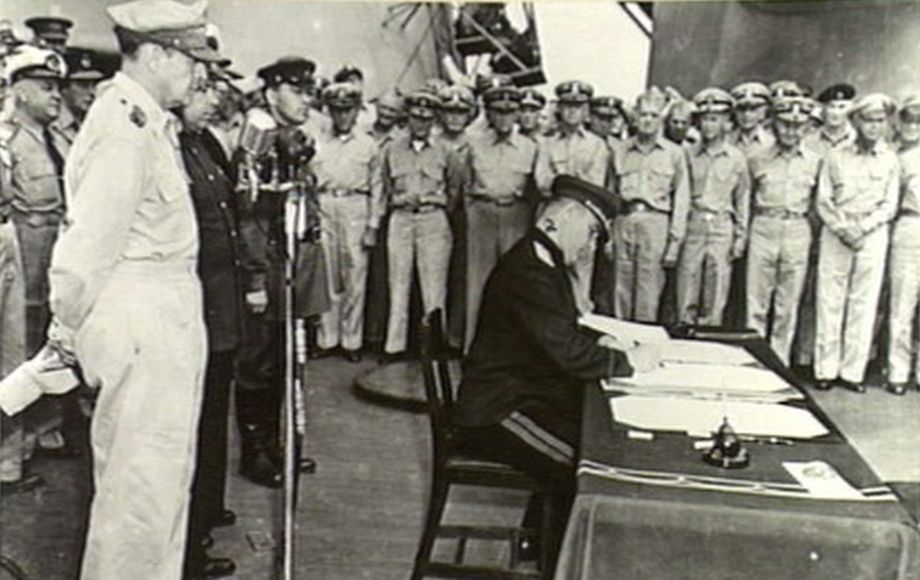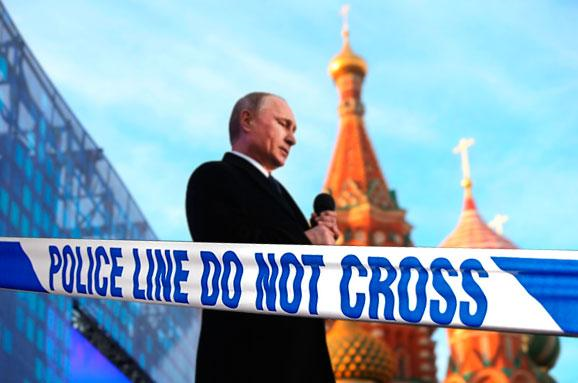By Nataliya Golicyna
The Russian government is now holding negotiations with the authorities of Kazakhstan and Belarus after Moscow's sanctions, banning the import of food commodities from Western countries, were implemented last week. The fact that Russia announced these restrictive measures without prior consultation of Customs Union partners indicates the haste with which the Kremlin implemented sanctions.
This is the opinion of Sergey Guriev, a former rector at the Russian School of Economics and a current professor at Sciences Po Paris [Instituts d'études politiques]. In an interview with Radio Liberty, Guriev comments on the situation with the consumer market and talks about new risks for the Russian economy.
– Any elimination of competition is profitable for a producer, so the ban on importing food products is very good news for Russian agriculture. On the other hand, it is still unclear where these sanctions will lead and how long they will be in place. For the time being, they are implemented for only a year. Due to inflation, the Central Bank [of Russia] will likely react to the situation by raising interest rates. There is a lot of uncertainty however, in general, we can expect growth in agricultural production within Russian.
– Would there be a reason or some incentive for agricultural manufacturers in the food industry to do this [increase production], while not knowing what to expect in a year's time?
– I think the main scenario being examined in business circles today is the lifting of sanctions as a result of a decision by the WTO, which undoubtedly would recognize the sanctions as illegal if Europe filed an appropriate legal claim. If the WTO were to reach this decision, then all the WTO members would be free to export to Russia. First of all, this would have an effect on the export of steel, hence, the Russian government would likely have to take a step back and lift the sanctions. Although this would probably not happen in one year, but in two year's time. On the other hand, if you are given an opportunity to take over a market share and establish preferences for your products amongst the consumers, this would usually constitute a very big advantage, even if the restriction of competition is only temporary. In this sense, many farmers are certainly happy, regardless of the fact that the sanctions are only engaged for one year.
– Is it possible that we might return to the lean times of the late 1980s and early 1990s?
– The decisions made so far, of course, don't mean a return to lean times. But the fact that these decisions are being made completely out of the blue, hints that there are plenty more surprises in store for us. For this reason, we can't rule anything out. Let me remind you that Russia is a member of the Customs Union, along with Kazakhstan and Belarus. From what we know presently, it appears the Russian authorities have failed to consider this. Hence, a paradoxical situation emerges, since you can import products from the EU, USA, and Australia into Belarus and Kazakhstan, but not into Russia. It is still unclear how this will work, considering that there are no customs borders between Russia and Kazakhstan or between Russia and Belarus.
– In case of a practically inevitable rise in the price of staple goods, would transition to a command economy be possible, in your opinion?
– It is quite possible. This has not happened yet, but so many unexpected things have happened within the past six months, that I wouldn't exclude the possibility of price regulations being imposed onto staple goods.
– You mentioned the countries of the Customs Union. It is only natural to assume that embargoed products will simply be sent to Russia by Russia-friendly countries, only in new packaging.
– Yes, it is very possible. We have seen that, when the import of Georgian wine [to Russia] was banned, so-called Greek wine emerged in Russia - which was manufactured with Georgian technology, but bottled in Greece. In this case everything would be even simpler because, generally speaking, European goods are completely legal in Belarus today.
– Could it be that this was intended, that all of these goods would eventually arrive from Belarus and there would be no problem?
– It is quite possible. But, if this happens, then the import ban will not attain its goal, which is to punish European countries and force them into re-thinking support for America's sanctions. I think that Russia's sanctions were being prepared in secret from economic departments, and no one told the developers of the sanctions that Russia is a member of the Customs Union. Moreover, these sanctions have already played a negative role in domestic policy. It is obvious to the reasonable part of Russia's middle class that the government doesn't care about their well-being. Whether or not these goods come in through Belarus, the implementation of these sanctions gives off a clear signal that the Russian government cares only about pursuing its foreign policies and doesn't care about the well-being of its people.
– How will these sanctions impact the general state of the Russian economy?
– A rise in inflation might occur as a result of these sanctions. Different [economic] models give different estimates. The issue is that the general price level in 2014 will rise by 1 or 2%. This is not a catastrophe. Moreover, even this rise in inflation can be prevented if the Central Bank would raise its interest rates. On the other hand, a rise in interest rates would lead to a further slowdown in economic growth. Instead of the 1% economic growth currently predicted, we will end up with even less growth, most likely zero. But overall even this isn't a catastrophe. The main drawback of these sanctions is that the authorities have shown they are ready to go to great lengths at the expense of the well-being of the middle class. Perhaps this meaningful policy is part of the face-off between the middle class and Russian authorities that began two years ago.
– Russian media writes that these Russian sanctions will have a negative impact on Western agricultural production and food industry. How negative will this impact be?
– Perhaps the Russian authorities themselves believe what is written in Russian media and don't read the Western newspapers. In the global media this news has certainly not gone unnoticed, but it isn't at the forefront. Of course, it is a substantial problem for agriculture, however, even for European agriculture, export to Russia is only 10% of total agricultural exports. Export to Russia makes up less than 0.1% of the European GDP. This is absolutely insignificant within the scope of the European economy. The numbers are even smaller within the US. American goods in Russia make up only 1% of the total agricultural exports of the US. In this sense, a ban on import from America is only a symbolic gesture.
– How dangerous are Western sanctions for the Russian economy?
– So far the sanctions are preventative and symbolic measures. They scare the investors into thinking that real and serious sanctions might follow. I think the main blow, which investors are thinking about, is the blow to the Russian financial system. At the moment, American and European sanctions target major Russian banks. For now, their access to Western capital markets is restricted. This is not the type of measures that can seriously harm the business of these banks in the short-term. It could have a serious effect in two or three years' time, but in the short run, it won't have any sufficient impact on the business of Sberbank and other Russian banks. On the other hand, there are instances showing that the US can, for example, implement full-scale sanctions against Russian banks. This has happened with the Rossiya bank and other smaller banks. If the same were to happen with the major Russian banks, this could deliver a very serious blow to the Russian financial system, however, this sort of a blow will cost the Western countries nothing since the Russian financial system bears no influence on the state of the global economy. It doesn't bear any effect on the well-being of European and American citizens. In all likelihood, if Western politicians manage to convince Vladimir Putin to stop escalating the conflict in eastern Ukraine, then these [full-scale] sanctions will not be implemented.
– Nonetheless, could the Western sanctions affect living standards in Russia?
– They have already had an impact on standards of living, as investors are pulling their money out of Russia. The capital withdrawal in the first half of 2014 turned out to be more significant than capital flight throughout the whole of 2013. The Russian stock market has lost approximately 20%, while other emerging markets are growing rapidly. For example, the Turkish market has grown by 25% and the Brazilian market by 15%. This is a serious difference. And this, of course, effects the value of the ruble, which should have been rising considering such high prices on oil, however it hasn't due to capital flight. But this is not that scary, compared to what could happen in the coming years.
– Do you agree with Aleksei Kudrin, who believes that the Western sanctions will cause growing distrust of the Russian market amongst investors and will therefore lead to a slowdown in economic growth?
– Absolutely. The main fear of investors is not so much the sanctions, but the irrational actions on the part of Russian authorities. They are beginning to comprehend that they can expect almost anything from the Russian authorities. This, of course, scares the investors away much more, as well as talk about sanctions against the Western automotive industry and airlines. Certainly, this lowers the confidence of investors.
– In one of your interviews you remarked that Russia will run out of money by 2018. What is your assertion based on and what would this mean for Russia?
– Russian budgetary forecasts stem from unrealistic assumptions about the rate of economic growth. The promises introduced by Putin in the decrees of May 7, 2012, and to which he has tried to adhere during these two years, were grounded in a similar [unrealistic] way. We can see that the situation is much more alarming than anticipated not only in 2012, but even at the beginning of 2014. Russian officials are now openly saying that Russia has run out of money. Discussions are being held about imposing new sales taxes, raising the value added taxes, and confiscating funding from the pension system. It's too late to talk about reimbursing the sum of money confiscated in 2014. All hopes concerning the savings from 2015 are lost as well. These are not trivial sums [of money].
At present, the government is talking about being short 500 or 700 million rubles per annum. Following these estimates, one can assume that the Reserve Fund and National Wealth Fund will run out of money by approximately 2018, if nothing changes. In the meantime, the situation is constantly worsening. The imposition of new taxes could result in economic growth slowing down even more. The imposition of new sanctions and a rise in interest rates by the Central Bank of Russia could also lead to an even greater slowdown in economic growth. As a matter of fact, everything will be much worse than currently claimed by the government, if, for example, the oil prices do not go up or if, for some reason, the Russian government does not begin the promised reforms. The slowdown of economic growth to zero or even a recession is, of course, no catastrophe, but Vladimir Putin would have to abandon his promises declared in the May 7 2012 decrees. The government would simply have to cut down either on defense expenditures or on social expenditures. For now the president has been saying there is no way this could happen and that he will continue to fulfill his obligations. Although, apparently, this cannot be done.
– Do you think that Putin is striving to isolate Russia from the West and, possibly, intends to create a softened version of the "Iron Curtain?"
– I can only discuss this topic hypothetically. I would say it is clear to anyone familiar with Russian history that, even in periods of history where Russia tried to pursue a policy of isolationism, it was still dependent on the Western countries. For instance, Stalin's Industrialization of 1928-1940, which is much admired by supporters of the direction Russia is currently headed, was possible only because the USSR was trading with the West and was importing advanced Western technology. We see a similar situation taking place today. The sanctions imposed by the West indicate that, unfortunately, Russia will not be able to import advanced technology in the primary sector. In particular, in two-five years' time this will mean a decline in the excavation of oil and gas and, therefore, lead to severe economic issues, including budgetary problems.
– Right now there is a lot of talk that Russia will reorient its economic and political partnership away from the West and toward the East, particularly China. What are the prospects of this for Russia, in your opinion?
– In a way this is a forced choice because, if Russia isolates itself from the West, its main market for Russian export would undoubtedly turn out to be China. The other thing to consider is that China has never foregone its benefits and will be building relations with Russia around its own gain. Negotiating with China is always difficult. The conditions put forth by China concerning the energy issues eventually led Russian government to consider whether it should capitalize Gazprom by means of consumer taxation, which means that Gazprom will not have the capacity to easily fulfill its gas contract with China on its own. As a matter of fact, it is a sign that they couldn't secure very profitable deals in the contract and that the Chinese negotiators took advantage of Russia's desperate situation. But overall, of course, they have no choice. After all, trading with China is better than complete autarchy.
– Many observers are suggesting that the West simply drop oil prices as a means of hurting Russia with the sanctions. Does this scenario seem realistic to you?
– The Western countries, undoubtedly, will be trying to do everything possible to lower the price of oil in the near future. The situation in Crimea and in eastern Ukraine has significantly increased the probability of America starting to export shale gas to Europe, which would significantly lower the price of gas in Europe. But there are no prospects of a direct deal being made between the West and Saudi Arabia in order to lower the prices on oil to an inconvenient level for Russia. On the other hand, Americans would become more interested in cooperating with Iran. Iran is moving further and further onto the global markets, which would result in lowering the pressure on oil prices. Americans and Europeans were always interested in low oil prices. Right now they simply have additional incentive to start investing their economic and political resources into this.
– Can we expect further and harsher Western sanctions on Russia if its policy toward Ukraine doesn't change?
– That is exactly what the American and European leaders are saying. They say the situation in eastern Ukraine is disturbing and if Russia continues the destabilization, it will be threatened with further sanctions. Their intent to implement new sanctions if the situation doesn't change is apparent.
– Do you think Russia will be paying the $50 million as ordered in the verdict by the Hague arbitration court? And if it does, how would this affect its economy?
– It is a huge amount of money for the Russian economy, comparable with the value of last year's capital outflow and equal to one-third of the aggregate budget of the Stabilization Fund of the Russian Federation, in particular the Reserve Fund and the National Wealth Fund of Russia. I think Russia will do everything it can to get out of paying this sum. Accordingly, the YUKOS stockholders will be confiscating Russia's assets all over the world. However, it is difficult to make an accurate prediction. But this is a huge sum of money, which Russia will not want to pay from the economic point of view and from the viewpoint of wanting to preserve its political image globally, as well as internally.
As a Russian national, it makes me sad watching how these sanctions are being implemented against Russian companies and how Russia is responding with sanctions that directly harm Russian citizens. It is a big pity that this is happening in today's world, which is full of opportunities for mutual co-operation and economic growth, economist Sergey Guriev states in his interview to Radio Liberty.
[hr] Source: Radio Liberty
Translated by Dasha Darchuk, edited by Elizabeth Martin





